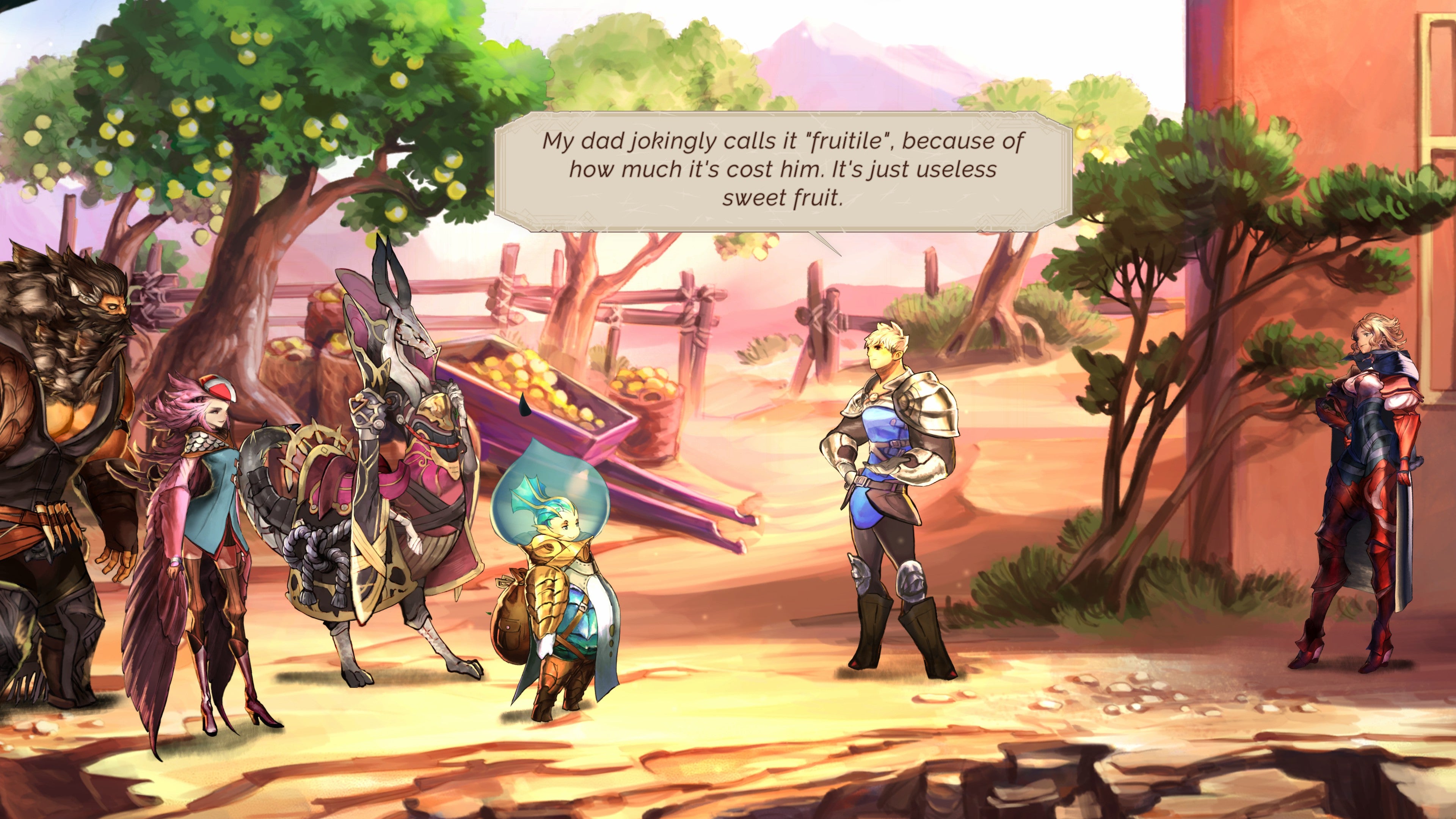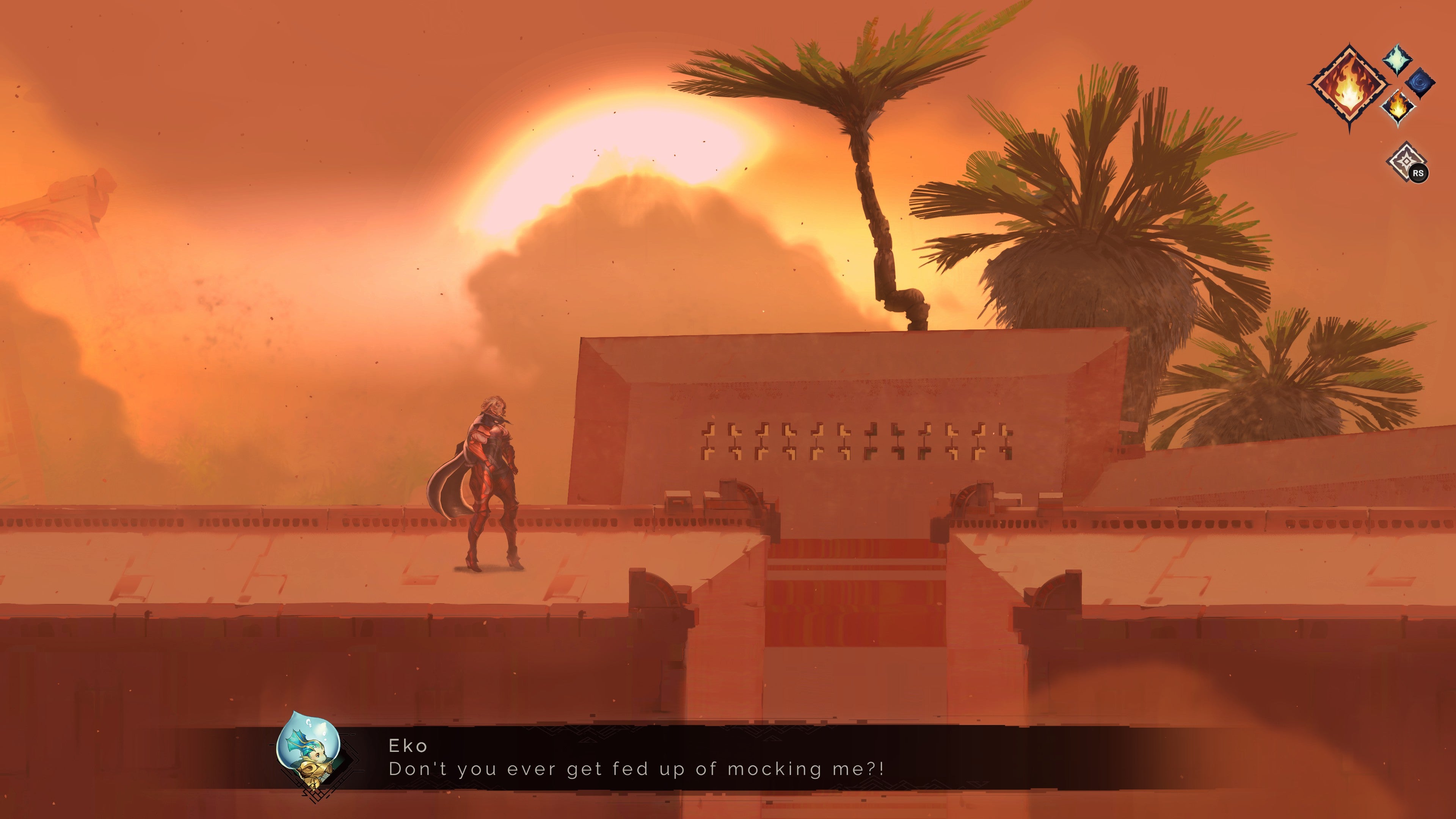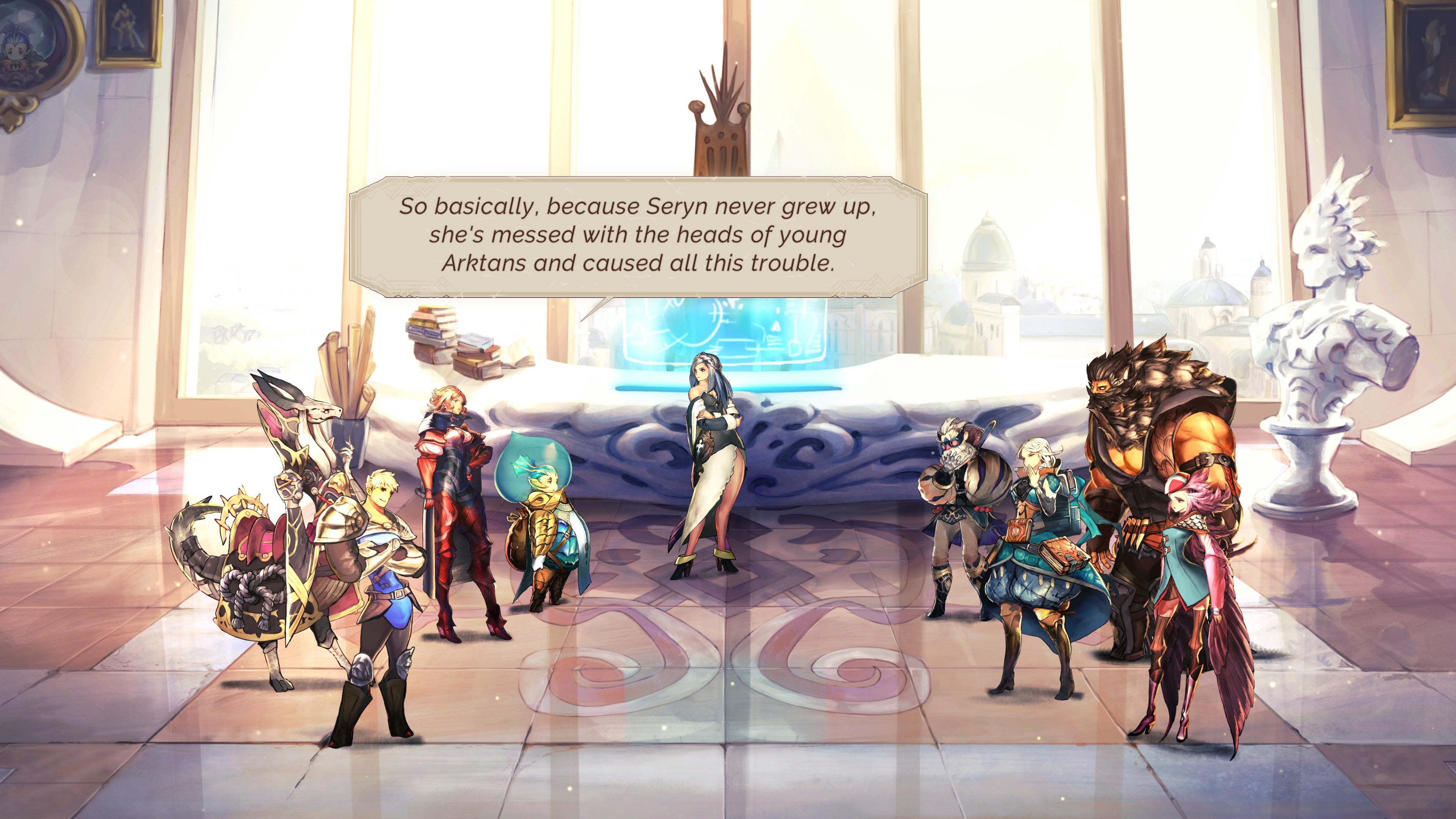French Canadian developers Artisan Studios have certainly tried hard to fulfill J part of this Japanese-inspired RPG, acquiring the talents of Final Fantasy XII composer Hitoshi Sakimoto and Final Fantasy X writer Kazushige Nojima to bolster their small team, but even these big name veterans can’t salvage this game from the depths of its own tedium. Between its bewildering, colour-swap dungeons, cringeworthy voice acting and uneven focus on its large cast, Astria Ascending stumbles before it ever has the chance to soar. If you’ve played Artisan Studio’s previous game, Hyperdimension Neptunia spin-off Super Neptunia RPG, Astria Ascending will no doubt feel eerily familiar. Like Neptunia, this is a 2D sidescrolling RPG where towns and dungeons are all navigated by running left and right. There’s also a mild platforming element to it as well, although beyond the odd crumbling wood panel you’re mostly just jumping over simple gaps and up ledges. Later, you obtain a special ring that lets you plonk down rock statues of yourself to activate switches or reach even higher ledges, but that’s about as challenging as it gets. Instead, the greater challenge comes from trying to decipher Astria’s next to useless map. Since the world is entirely 2D, each section of the map is laid out a bit like a layered diorama, with doorways in overlapping panels connected by blue dotted lines. The problem is that every panel is just as featureless as the last, and the marker indicating your current position always remains in the panel’s centre, making it hard to tell where you are in relation to its maze-like warren of doors and treasure chests. It’s just about manageable for the first half of the game, but when you’re given free roam of the map later on, it becomes a real kick in the teeth. If you thought finding the right exit on terra firma was hard enough, wait until you encounter the large airborne kingdom of the Archipelago, where walls and partitions simply don’t exist. What’s more, on the off chance you do find an exit you’re not meant to yet - you’ll be revisiting these identikit locations multiple times, after all - the way Astria Ascending stops you progressing is so tonally dissonant that I was tempted to chew the thumbsticks off my controller in a white hot rage (I would have opted to smash my face into my keyboard, but mouse and keyboard support wasn’t available in my review build). Most JRPGs have a bit of level-gating here and there, but usually have the decency to make it at a bit believable. You know, a nice fallen tree or hot wall of fire. With Astria Ascending, the only thing standing in your way is a lone NPC telling you, “This area’s too dangerous right now, I can’t let you pass.” It’s a move they’ve pulled straight out of Super Neptunia RPG, but while Neptunia’s youth and inexperience might have held the fantasy together back then, here you’re a party of eight-strong legendary warriors, chosen heroes lauded for their prowess in battle and supernatural abilities. Heck, you’re all called demi-gods, for crying out loud. I think they can take a bit of danger. Then again, having spent several hours in the company of these so-called heroes, I am beginning to understand why the local populus keep tutting and wagging their fingers at them. They are extremely incompetent. For much of the game’s first half, foes constantly slip through their fingers, even after hard-won boss fights. In one particularly excruciating sequence early on, for example, you spend the better part of an hour hunting down one of the game’s infuriatingly dimwitted Migmie creatures after it captures one of your own in a magic jar. You’d think a party of eight would be able to snare a flying rat monkey with relative ease, but no. Every time you fight this thing, everyone remains rooted to the ground shaking their fist, cursing at how they’ve let it escape once again. This cycle of near-misses quickly becomes deflating for the player, and it’s not long before you start to see this ineptitude for what it is: padding for an already baggy and preposterous story about a bunch of dissidents embracing the tyranny of chaos because, wait for it, they’ve stopped eating the world’s magical harmony fruit. Your party of demi-gods aren’t a particularly likable lot either. While everyone gets their own ‘poor me’ moment of backstory exposition, an uneven spread of dialogue means the bulk of time is used up by the four tedious human characters, shunting Astria’s more interesting characters to the sidelines. Leader and shield maiden Ulan does her best to keep this rowdy bunch in tow, but between the cheesy, suck-up soldier Alek, openly racist old codger Arpajo and his head-shaking summoner wife Alassia all joining in to dunk on poor rotund fish boy Eko right from the word go, the party leaves a lot to be desired. In fairness, burly lion mage Dagmar, wispy bird fencer Kaydin, and stoic lizard warrior Kress all do their fair share of disparaging teasing as well, but they’re often drowned out by the grating gripes of Arpajo. It’s not funny. It’s just mean-spirited writing, made worse by some truly nails-on-a-chalkboard voice-acting, and it does little to endear you to the cast you’ll be spending the next 30-odd hours with. Yes, there is a Japanese voiceover you can switch to, but you’re still lumbered with reading its knuckle-bitingly bad script. Thankfully, they do at least park their racial differences at the door when it comes to combat, and Astria’s turn-based battles do a decent job of livening up its turgid story segments. Rhythmically, fights have a lot in common with Final Fantasy X. While your main party consists of four fighters, you can swap characters in and out at will, and even make mass substitutions in a single turn. You lose a turn doing so, meaning Astria’s fights aren’t quite as nimble and light on its feet as Final Fantasy X, but it does give you the full spread of character abilities to play with as you please. Said abilities are also tied to Sphere Grid-esque job boards, letting you spend points to boost your stats, learn new abilities and passive support powers in whatever order you like as you work your way round different types of star constellations. Mechanically, however, the combat borrows more from Bravely Default, albeit with mixed success. At the heart is your Focus bar. Not only can characters spend a turn ‘focusing’ to increase your number of focus points, but you can spend up to four of them in one go to beef up one of your attacks, increasing its power by up to 200%. It’s an interesting riff on Bravely Default’s risk and reward system, but early on it can feel like a bit of a false economy. The number of turns I’d spend building up focus points, for example, never seemed to do more damage than if I’d just been attacking every turn. However, once you realise that exploiting enemy weakness also adds to your focus bar, battles become a much livelier kind of puzzle. You spend less time wasting turns ‘focusing’ and more time experimenting with your varied ability set. And yet, there are still aspects of Astria Ascending’s battle system that could do with just a bit more polish. The MP cost of spells and abilities seems wildly out of whack with the number of magic points you have, for example - a problem that could be remedied, perhaps, if your MP bar automatically regenerated outside of battle, just like your health bar does. Money suffers from the opposite problem: monsters constantly drop vast quantities of the stuff. Sure, you’ve got a party of eight to constantly outfit and equip with new weapons, but it’s rare to come across an RPG that lets you upgrade everyone quite comfortably in a single shopping trip and still have change. You get a chance to trigger a pre-emptive strike on enemies before a fight, too, but there’s no audio or visual feedback to tell you you’ve done it successfully. All right, there is a slightly higher pitched ‘shing’ sound, but the hit itself always feels feeble and empty. Sometimes it will trigger when you’re seemingly standing miles away from it; others you can whack it right up close and you get nothing. Altogether, the combat is just cumbersome enough to make every fight feel like a drag, and a poor imitation of more sophisticated systems you’ve seen elsewhere. It’s something I’d probably be willing to put up with were it buoyed by an exceptional story and lovable cast of characters, but Astria Ascending fails on all counts. By all means give it a go on Game Pass if you’re desperate to see what it’s like, but be warned: this is not a game that respects your time. There are far better avenues to pursue if you’re after an engaging JRPG. The only thing you’ll achieve by taking this particular detour is a one-way street to disappointment.



